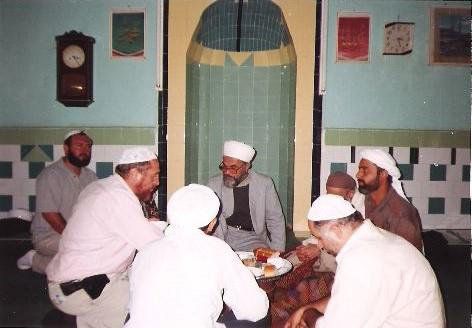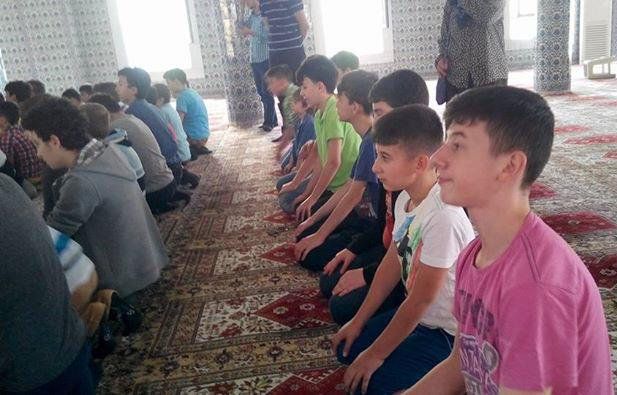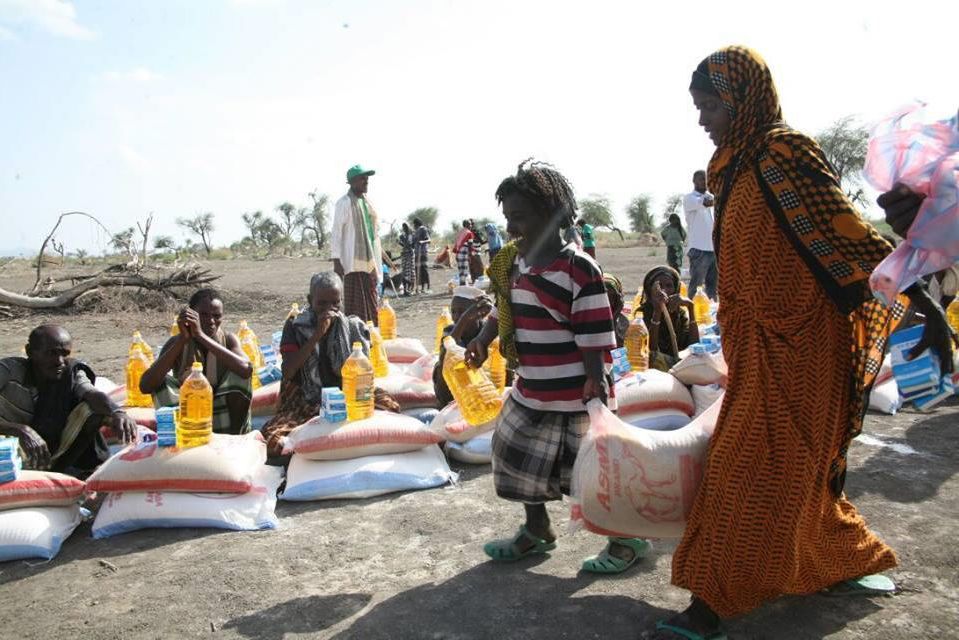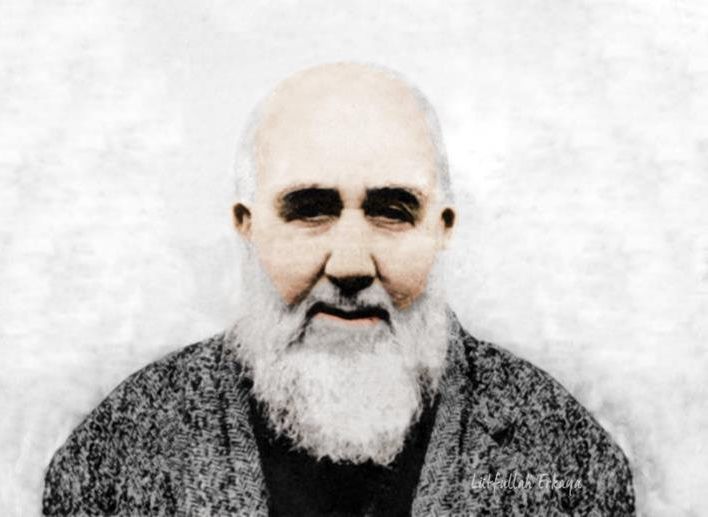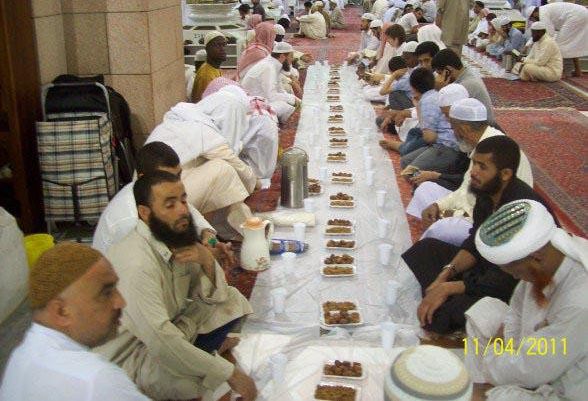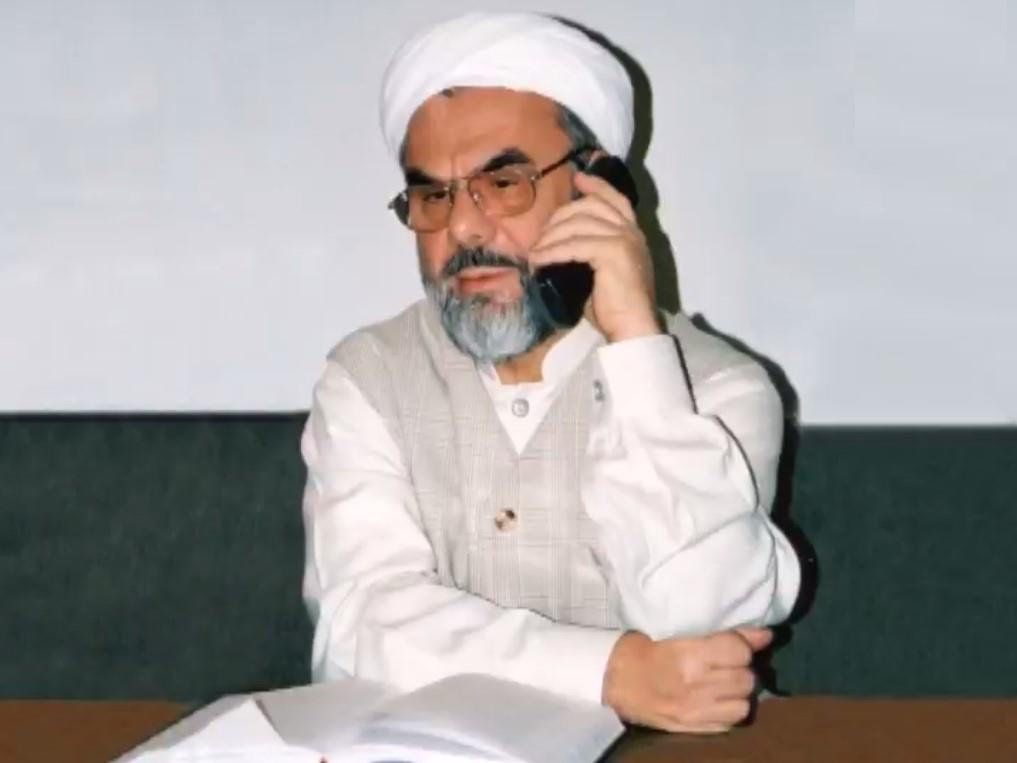04. VIRTUES OF RAMADHAN
Prof. Dr. M Es'ad Cosan
As-salâmu aleykum wa rahmetu’llàhi wa berekâtuhû!
Peace, mercy and blessings of Allah be with you.
Dear Brothers and Sisters,
May Almighty Allah be pleased with you. May He have you benefit from the mercy and blessings of this month that are prepared for the virtuous servants of Allah.
Dear Brothers and Sisters!
Salmân-i Fârisî RA was one of the closest companions of the Prophet SAS:9
سَلْمَانُ مِنَّا أَهْلَ الْبَيْتِ (ك. طب. عن كثير بن عبد الله المزني عن أبيه عن جده)
(Salmâni minnâ ehle’l-beyti) "Salmân is from us, my family."
Salmân RA reported:10
9 Hàkim, Müstedrek, c.III, s.691, no:6539, 6541; Taberânî, Mu’cemü’l-Kebîr, c.VI, s.212, no:6040; Isfahànî, Ahbâr-ı Isfahan, c.I, s.136, no: 125; İbn-i Asâkir,
Târih-i Dimaşk, c.XXI, s.408; Mizzî, Tehzîbü’l-Kemâl, c.XI, s.251; İbn-i Sa’d,
Tabâkàt, c.IV, s.83; İbn-i Hibbân, Tabâkàtü’l-Muhaddisîn, c.I, s.203; Küseyr ibn-i Abdullah el-Müzenî Rh.A babasından, o da dedesinden.
Bezzâr, Müsned, c.II, s.293, no:6534; Deylemî, Müsnedü’l-Firdevs, c.II, s.337,
no:3522; Hz. Ali RA’dan.
Mecmaü’z-Zevâid, c.VI, s.189, no:10137 ve c.IX, s.154, no:14688, 14689;
Kenzü’l-Ummâl, c.XI, s.690, no:33440; Keşfü’l-Hafâ, c.II, s.490, no:1505; Câmiu’l- Ehàdîs, c.XIII, s.284, no:13125.
10 İbn-i Huzeyme, Sahîh, c.III, s.191, no:1887; Beyhakî, Şuabü’l-İman, c.III,
s.305, no:3608; Heysemî, Müsnedü’l-Hàris, c.I, s.412, no:321; İbn-i Şâhin, Fadàilü
Şehri Ramadàn, c.I, s.18, no:16; Selmân-ı Fârisî RA’dan.
Kenzü’l-Ummâl, c.VIII, s.757, no:23714 ve s.961, no:24276; Câmiü’l-Ehàdîs, c.XXIII, s.176, no:25782.
خَطَبَنَا رَسُولُ اللهِ صلى الله عليه وسلم فِي آخِرَ يَوْم مِنْ شَعْبَانَ، وَقَالَ:
أَيُّهَا النَّاسُ! قَدْ أَظَلَّكُمْ شَهْرٌ عَظِيمٌ، شَهْرٌ مُبَارَكٌ، شَهْرٌ فِيهِ لَيْلَةٌ خَيْرٌ
مِنْ أَلْفِ شَهْر ؛ شَهْرٌ جَعَلَ اللهُ صِيَامَهُ فَرِيضَةً، وَقِيَامَ لَيْلِهِ تَطَوُّعًا، مَنْ
قَرَّبَ فِيهِ بِخَصْلَة مِنَ الْخَيْرِ أَوْ أَدَّى فَرِيضَةً، كَانَ كَمَنْ أَدَّى سَبْعِينَ
فَرِيضَةً فِيمَا سِوَاهُ.
(Khatabanâ rasûlu’llah SAS fi akhiri yawmin min sha'ban) "On the last day of Sha'ban, the Messenger of Allah delivered a sermon."
According to Salmân RA, the Prophet SAS said:
(Yâ ayyuha’n-nâs) O mankind (Qad ezallekum shehrun
azîmun) A great month has cast a shadow on you." Since it is still Sha'ban, not Ramadhan yet, the Prophet expressed it that way.
(mubârakun) "It is a blessed month, (shahrun fîhi laylatun khayrun
min elfi shehrin) a month in which is a night that is better than a thousand months."
As you know, the Night of Power is better than one thousand
months. It is somehow hidden in Ramadhan. The Prophet SAS suggested: "Search for the Night of Power in the last ten days of Ramadhan." He also suggested the odd days of Ramadhan. The Prophet would spend the last ten days of Ramadhan in the mosque.
He would not go to his house; he would spend his time in worship.
For us to benefit from the blessings of the Night of Power, we must
follow the footsteps of the Prophet.
Dear Brothers and Sisters! Prophet Mohammed SAS was a messenger of Allah, His most beloved servant, the master of all who lived before and after him, the noblest of all mankind, the leader of
the prophets, and the owner of the highest stage in the hereafter.
He was exemplary in code of conduct and in the lifestyle.
Everything about his was excellent. Yet during the three months
season, he would do more worship despite the fact that he was in a state of worship continuously. This is a great observation for us to take a lesson.
During the month of Rajab, the prophet fasted more days than
he did other months. Rajab is the month two months before
Ramadhan. There is the Raghàib Night in Rajab. That is a signal
for Muslims to realize that three months season has arrived.
Almighty Allah grants great blessings during the night of Raghàib.
In the twenty-seventh night of Rajab, the Prophet had the Mi'raj.
The Prophet was accepted to the Divine Presence and saw Almighty
Allah during Mi'raj that happened in Rajab.
The Prophet maintained his worship in Sha'ban. He maintained
his fasting, too. There is the night of Bara'ah in the middle of Sha'ban. We have had the Bara'ah Night and reached Ramadhan.
The Prophet was delivering His sermon at the end of Sha'ban. I am reading the hadith reported by Salmân RA.
a. The Night of Power and I’tikâf
In the hadith the Prophet SAS indicates how great and blessed
the month of Ramadhan is. Then, he states that the Night of Power
that is better than one thousand months is hidden in the month of Ramadhan. Since the Night of Power is hidden in Ramadhan, we should spend every night of Ramadhan as if it is the Night of Power.
In fact, there is a proverb: "Consider every night as the Night of Power, every person you meet as Khidir." The person you meet
could look poor, homeless, be in need of a hair trim, yet you must
not look down upon him. He could be Khidir AS. Do not spend your night in unawareness; it could be the Night of Power. Our ancestors
recommended us to enliven every night as though it were the Night
of Power.
The very first thing the Prophet pointed out in this hadith is the Night of Power. Then we must keep the Night of Power in our mind
as an important matter. We have the intention: "If Almighty Allah
allows me, I would like to do i'tikaf as the Prophet did in the last ten days of Ramadhan. I will spend the day and night in a mosque.
I can read the jurisprudence books and learn about the manners of the i'tikaf. It is a Sunnah muakkad. If nobody does i'tikaf in a locality, everybody in that locality will be held responsible. I will do it this Ramadhan." Let us have this intention and catch the Night of Power.
Almighty Allah has promised: "You ask from Me, I will give you what you want." Our beloved Prophet SAS said that Almighty
Allah would give Paradise for those who want it. That is why we need to turn to Allah in prayers and ask from Him with sincerity
and zeal.
There are ahadith that each Muslim should ask Almighty Allah
Prof. Dr. M. Es'ad COŞAN, SWEDEN
for martyrdom: "My Lord! Let me give my life for Your sake in Your
path. Grant me martyrdom." If a person does not have a desire to die as a martyr, he dies in a state of hypocrisy. Each Muslim should
be willing to give up his life for Allah.
If a Muslim dies in his bed with the desires of becoming a martyr, Almighty Allah would elevate his rank to the level of martyrs. This is stated in the ahadith. That means the intentions
are very important.
Then we should have the intention of "catching" the Night of Power by practicing i'tikâf in the last ten days of Ramadhan. We remind our brothers and Sisters so that they do not miss the opportunities. We reminded about the three months over two months ago. We reminded about Sha'ban and Ramadhan. Now I am telling you about the Night of Power.
b. Sacrifice on the Eid-al-Fitr
Let me tell you something else. As you know we sacrifice an animal on the Eid-al-Adha. Those who are qualified as "rich" from
an Islamic point of view would buy a good-looking ram and slaughter it on the day of Eid-al-Adha. May Allah accept their
sacrifice. We ought to have the intention about Eid-al-Adha, too: "By the will of Allah, I intend to sacrifice an animal on the next Eid- al-Adha." Let it be our practice to have intentions for good deeds.
Sacrificing an animal on the day of Eid-al-Adha is a must
(wajib), and every practicing Muslim who is "rich" does that. Yet there is the sacrifice on the day of Eid-al-Fitr. We are on the second
day or Ramadhan, and I am reminding you ahead of time:
Sacrificing an animal on the day of Eid-al-Fitr has so much
rewards—seven hundred folds!
In a hadith the Prophet SAS listed four deeds that are rewarded
in seven hundred folds:
1. Spending in the way of Allah is rewarded seven hundred folds:
Jihad, Hajj, Umrah and alike.
2. Spending for the parents is rewarded seven hundred folds:
their food, clothing, rent and alike.
3. Spending for the family is rewarded seven hundred folds.
Isn't that nice? Islam pays utmost attention to the love and affection in the family. Taking a bag of grocery for the spouse and children would make them happy and content, so they would not look at what other people have. They would find all they need at home. All of this spending is rewarded seven hundred times.
4. Sacrificing an animal on the day of Eid-al-Fitr is rewarded
seven hundred folds. Why is it so? The Eid is a happy day, a day to celebrate. If one slaughters an animal on that day, there would
be an abundance of sustenance in the house. Do not think of Turkey
or our time only. Islam is for all times and places. Imagine a desert
or a remote village where there are no butcher shops or grocery
stores. Think about the times of scarcity.
When an animal is sacrificed, there would be abundance and feast in the house. One could entertain his guests easily by offering
them meat dishes. That is also a reminder for you. I have reminded you two things that we could practice in near
future: Practice i'tikâf during the last ten days of Ramadhan so that you could appreciate the Night of Power and not miss it. Then, by the will of Allah, if you have the means, you sacrifice an animal on the day of Eid-al-Fitr and receive seven hundred folds of rewards.
Salman RA, the companion of the Prophet, the crown of our heads, reported from the Prophet SAS: "Our beloved Prophet
delivered a sermon on the last day of Sha'ban." First he said that Ramadhan is a great month, it is a blessed month, and he said that there is the Night of Power in Ramadhan. These are very important.
c. Tarawih Prayer
The Prophet SAS continued in the hadith:
شَهْرٌ جَعَلَ اللهُ صِيَامَهُ فَرِيضَةً، وَقِيَامَ لَيْلِهِ تَطَوُّعًا
(Ja'alalàhu siyâmahû farîdaten wa qiyâma laylihî tatawwu'an) "Allah made fasting during the days in this month obligatory (fard) and prayers at night non-obligatory but rewarding (tatawwu)." We all fast during the day and offer Tarawih prayers after Ish'a as the tatawwu' worship. We practice Tarawih as the sunnah of the Prophet SAS with eagerness and zeal. It is in Ramadhan—not in other months.
Al-hamdu lillâh, we could not find any room inside the Yeni
Cami; we offered the sunnah prayer outside, then found some room
inside. I congratulate our brothers in Denizli—may Allah be pleased with them. It is the abundance of Islam that Muslims do not fit in the mosques and the congregation spills to the streets. It is an indication that the youth realize the beauty of Islam and practice it. We pray that it is a continuous effort and it increases in Tarawih Prayers
time.
d. Seventy-Fold Rewards for Good Deeds
The Prophet continued:
مَنْ تَقَرَّبَ فِيهِ بِخَصْلَة مِنَ الْخَيْرِ أَوْ أَدَّى فَرِيضَةً، كَانَ كَمَنْ أَدَّى
سَبْعِينَ فَرِيضَةً فِيمَا سِوَاهُ .
(Men taqarraba fîhî bi-hasletin mine’l-khayri aw eddâ farîdaten
kâne kemen eddâ seb'îne farîdaten fî mâ siwâhu) "If a person gets closer to Allah in this month by doing a good deed or fulfilling an obligation, he would be like a person who fulfilled seventy
obligations in other times." Zakat, for instance, could be paid in Ramadhan although it is not an obligation to be carried out in Ramadhan.
If a Person goes for Umrah in Ramadhan, he receives much more
rewards than he would if went for Umrah other times. This is the abundance of the month of Ramadhan.
Since I am following the hadith, I did not mention other ahadith
about Ramadhan that are introductory ahadith. Almighty Allah
prepares Paradise, heavens and earth spiritually in Ramadhan.
The gates of Paradise are opened for the believers, and the gates of Hell are closed. The sky is decorated. Almighty Allah orders Jibrîl
AS: "Go and tie the leaders of satans with chains and throw them
to the oceans. There are ahadith on this. It means the satans
become weaker and they do not fool believers as much as they would
other times. Almighty Allah reduces the temptations for evil. The decoration of the sky and Paradise, opening of the gates of Paradise and closure of the gates of Hell are good things. All these
happen because this month is an important month. A good deed in this month is rewarded as the fulfillment of seventy obligations
outside of Ramadhan. All of this means we should try doing good
deeds in Ramadhan as much as we can. This is so encouraging, isn't it?
e. The Month of Patience and Abundance
وَهُوَ شَهْرُ الصَّبْرِ،
(Wa huwa shahru’s-sabri) "And, it is the month of patience.” Almighty Allah ordered us not to do some of the pure and good
things during the day in Ramadhan:
"—Do not eat food or drink during the day."
We accept the order and observe it. We would not drink water
even if we get very thirsty. Well in some places Ramadhan could be in winter and the days would be short. However, in some places, it could be summer time. The days would be long. Our forefathers
kept fasting while they harvested the wheat during the hot days of summer. Their mouth got dry and their lips got cracked, yet they kept their patience. It is the month of patience.
Different parts of the world could experience different seasons
at a given time. For instance, our brothers in Australia are having
summer while you are having winter in Turkey. Your days are short while theirs is long. Nevertheless, all of us undergo some
patience test. If we maintain our patience from the morning till the night that would be excellent.
We are patient about not eating food and not drinking water
during the day. Another form of the patience is not getting angry.
You should not get angry with your children, your spouse, your neighbor or your associates. You have to be gentle, soft and calm
towards them. You have to control your eyes and your tongue.
These are also parts of being patient.
وَالصَّبْرُ ثَوَابُهُ الْجَنَّةُ؛
(Wa’s-sabru thawâbuhu’l-jannah) "The reward for patience is Paradise." The patience is very important. It could be hard for a person to maintain patience, yet its reward is Paradise. The Prophet promised Paradise for those who practice patience and fast properly.
وَشَهْرُ الْمُوَاسَاةِ،
(Wa shahru’l-muwâsâti) "This is the month of muwâsâh," i.e., helping somebody by giving him food, clothing or other things. We shall spare some money, go to the market, buy few things: half a kilo of cheese, three kilos of rice, five kilos of potatoes, some onions
and other things. We shall put them in a box and take it to a poor family. That would be a support for that family.
Ramadhan is the month of helping one another. A believer
should look after other believers, help the needy and make them
happy. He should help them cope with the economical hardship.
وَشَهْرٌ يُزَادُ فِيهِ فِي رِزْقُ الْمُؤْمِنِ؛
(Wa shahrun yuzâdu fî rizqi’l-mu'mini fîhî) "Almighty Allah
increases the sustenance of the believer in this month." In fact, if you draw a graphic of what you eat in your home and compare the section for Ramadhan with the rest of the year, you can see the increase in Ramadhan. That is because of the blessings of Ramadhan as indicated in this hadith. the sustenance of the believer is increased in Ramadhan. You see a variety of food at the table.
Our late master Mehmed Zâhid Efendi —may his abode be Paradise— used to say: "The sustenance of a person is what he eats,
no what he keeps in his safe." Imagine some cheese or jam in a jar.
Mehmed Zâhid KOTKU
If you lick the jar from outside, you get nothing. That cheese or jam is not your sustenance unless you eat it. In Ramadhan we witness that a variety of food would be at the table. If we try to count it, our fingers would not be sufficient; we would out-count the toes, too. This abundance in Ramadhan is due to the fact that is indicated in this hadith: "The sustenance of the believer is increased in this month." Sadaqa rasûlullah—the Messenger of Allah stated the truth.
f. Reward for Providing Food for a Fasting Person
فَمَنْ أَفْطَرَ فِيهِ صَائِمًا، كَانَ مَغْفِرَةٌ لِذُنُوبِهِ وَعِتْقُ رَقَبَتِهِ مِ نَ النَّ ارِ،
وَكَانَ لَهُ مِثْلُ أَجْرِهِ، مِنْ غَيْ رِ أَنْ يُنْ قَصَ مِنْ أَجْرِهِ شَيْءٌ.
(Men aftara fîhî sàimen kâne maghfiraten li-zunûbihî) "If a person provides food for a person who has fasted the day, he will have his own offenses forgiven." This is another aspect to remember. We shall generously invite people for dinner in Ramadhan.
(Wa itqa raqabatihî mine’n-nâr) "And he would free his neck
from Hellfire. (Wa kâne lehû mithli ejrihî) "What ever the reward
the fasting person earns, the same would be given to the person who provide him food in the evening (min ghayri en yenqusa min ejrihî
shay') without any decrease in the rewards of the person who fasted." This is very important, too, because we would earn the same rewards the fasting person gets when we invite him for dinner.
In the continuation of the hadith, there is another good news:
قَالُوا: يَا رَسُولَ الله، لَيْسَ كُلُّنَا يَجِدُ مَا يُفَطِّرُ الصَّائِمَ .
(Qàlû: Yâ rasûlallah! Leyse kullunâ yejidu mâ yufattirus-sàim.)
"O prophet of Allah! Not all of us have the means to provide dinner
for a fasting person." They had quite a bit hardship. They hardly
had any food in their houses to feed a person. They were curious
about what would happen to a person who could not provide much
of food for a fasting person. The Prophet said:
يُعْطِي اللهُ هَذَا الثَّوَابَ لِمَنْ أَفْ طَرَ صَائِمًا عَلٰى تَمْرَة ، أَوْ شَرْبَةِ مَاء ،
أَوْ مَذْقَةِ لَبَن .
(Yu'tillâhu hâdhe’s-thawâbe men fettara sàimen alâ temratin, aw alâ sherbeti mâ'in, aw medhkati lebenin.) "Almighty Allah gives
this reward to any person who offers a date fruit, a sip of water, or some milk to a fasting person." Even the small offers to the fasting
person are rewarded in large quantities.
Having heard of this hadith, we should provide things for people
to break their fast when the sun goes down. It would be quite
beneficial if one carries a bag of dates to offer to other people.
Sometimes, they would be on the road or at work when the time
arrives for iftar. They could break their fast with the date you offer.
You get your rewards.
Last week, we were traveling towards Izmir. We stopped at somebody's house. I told the host: "Bring something for us to break
our fast and earn the rewards." They brought food and we had iftar.
According to this hadith, they earned the same rewards that we earned by fasting without any decrease in our rewards.
g. Month of Mercy and Forgiveness
وَهُوَ شَهْرٌ أَوَّلُهُ رَحْمَةٌ، وَأَوْسَطُهُ مَغْفِرَةٌ، وَآخِرُهُ عِتْقٌ مِنَ النَّارِ.
(Wa huwa shahrun awwaluhû rahmetun) "This is such a month
that the first part is dominated by the mercy of Allah." We are surrounded by the mercy of Allah al-hamdu lillah! (Wa awsatuhû
maghfiratun) "The middle of this month is dominated by the forgiveness of the sins." We all have wrongdoing in the past, and we have so many shortcomings. As we keep fasting, Almighty Allah
forgives us our sins by the middle of this month. (Wa âkhiruhû itqun
minen nâr) "The last part of this month is freedom from the hellfire." Almighty Allah will say, "O My servant! You have fasted
in Ramadhan, I have forgiven you and freed you from the fire." It is for those who fasted in Ramadhan properly.
May Almighty Allah place us among those who are freed from
the Hellfire.
مَنْ خَفَّفَ عَنْ مَمْلُوكِهِ فِيهِ، غَفَرَ اللهُ لَهُ، وَأَعْتَقَهُ مِنَ النَّارِ .
(Men khaffefe an memlûkihî fîhî ghafara’llàhu lehû wa a'tekahû mine’n-nâr) As you know in the past the prisoners of wars could be taken as slaves. The slaves had to work hard. The
prophet said: "If a person reduces the burden on his slave in this month--some slaves were Muslims, yet they still had to work-- Almighty Allah forgives that person (wa a'tekahû minen nâr) and frees him from the hellfire."
h. Do Plenty of Dhikr and Supplication in Ramadhan
وَاسْتَكْثِرُوا فِيهِ مِنْ أَ رْبَعِ خِصَ ال : خَصْلـَتَ انِ تُرْضُـونَ بِهِمَا رَبــَّكُمْ، وَ
خَصْلَتَانِ لاَ غِنٰى لَكُمْ عَنْهُمَا. فَأَمَّا الْخَصْلَتَانِ اللَّتَانِ تُرْضُونَ بِهِمَا
رَبَّكُمْ: فَشَهَادَةُ أَ نْ لاَإِلٰ هَ إِلاَّ اللهُ وَتَسْتَغْفِرُونَ هُ. وَأَمَّا الْخَصْ لـَتَ انِ اللَّتَانِ
لاَ غِنٰى لَكُمْ عَنْهُمَا: فَتَسْأَلوُ نَ اللهَ الْجَنَّةَ، وَتَتَعَوَّذُونَ بِهِ مِ نَ النَّ ارِ.
(Festekthirû fîhî min erbai hisâl) "Do these four deeds in plenty
(Hasleteyni turdùne bihimâ rabbekum) two of these deeds will have
you earn the consent of your Lord. (Wa hasleteyni lâghinâe bikum
anhumâ) The other two deeds are something you cannot give up." What could be these four deeds? (Feemmel hasletâni’lletâni urdùne
bihimâ rabbekum) "What are the two deeds with which you are going to earn the consent of Allah? (Feshahâdetu en lâ ilâhe
illa’llah) To bear witness that there is no deity but Allah." This is a very important word. (Wa testaghfirûnehû) "The second one is seeking forgiveness."
What we understand is that we need to keep saying "Esh-hadu
en lâ ilâhe illallah" and "Estaghfirullah." We could say "Estaghfirullah al azîm wa etûbu ileyh" I had written in the magazines in the past: "Ramadhan is the month of Tasawwuf." As you see in this hadith, the Prophet is ordering the practices of Tasawwuf. You shall do the dhikr of "Lâ ilâhe illallah" and "Estaghfirullah." With these dhikr, you will make Almighty Allah pleased with you. It is grace of Allah that he
is pleased with us when we say "Lâ ilâhe illallah" and "Estaghfirullah." What a great system of belief!
Dear brothers and Sisters, do these dhikr and become a good
dervish.
(Wa emmel-hasletâni’lletâni lâ ghinâe bikum anhumâ) "The
other two deeds that you could not do without are (Fetes'elûna’llahe
’l-jenneh wa teùzûne bihî mine’n-nâr) asking Paradise from Allah
and seek refuge with Allah from hellfire." We shall keep praying:
"Our Lord! Send us to Your Paradise! Our Lord! Free us from the hellfire!"
وَمَنْ أَشْبَعَ فِيهِ صَائِ مًا، سَقَ اهُ اللهُ تَعَ الٰى مِنْ حَوْضِي شَرْبَةً،
لاَ يَظْمَأُ بَعْدَهَا أَبَدًا. Prof. Dr. M. Es'ad COŞAN
(Wa men ashbaa fîhî sàimen) "If a person provides food and water to somebody who fasted the day, (saqàhu’llàhu teâlâ min hawdî sherbeten) Almighty Allah provides that person from the pool of Kawthar in a way that (lâ yezmau ba'dehâ ebedâ) one who drinks
from that pool never feels thirsty again."
With this hadith, the Prophet had given us the good news that the person who provides some food to another person who has fasted
the day will be served from the pool of Kawthar in Paradise. Thus
we have completed the hadith. If you took notes, you have gathered
quite a bit of information. Let us go over the hadith:
We must be careful and not miss the Night of Power. For this, we should practice i'tikâf in the last ten days of Ramadhan. If we have the money, we should sacrifice an animal on the day of Eid-al- Fitr. We must realize that this month is the month of patience and remember that the reward for patience is Paradise. If a person does good deeds in this month, he will receive the rewards in seventy
folds. We must do charitable deeds in this month.
The sustenance is increased in this month, and we must be thankful for that and say "Alhamdu lillah!" We shall support the poor and needy by giving them money or goods. Everybody will have some kind of a feast in Ramadhan, and feel free of hardship.
Those who provide food for a person who is fasting will be forgiven their sins and are freed from the hellfire. They also receive
the same rewards that the fasting person receives. That is why we need to open our doors and invite people for iftar. If we cannot
afford it, we could offer simple things such as a cup of water, a date fruit, or some milk to a fasting person to break his fast in the evening. That will also bring the same rewards.
We shall do the dhikr "Lâ ilâhe illallah" and "Estaghfirullah" in plenty and ask for Paradise from Almighty Allah. We shall also ask Almighty Allah to be saved from the hellfire often: "Or Lord!
Forgive us our wrongdoing. Do not send us to hellfire. Keep us in Your Paradise!"
May Almighty Allah have you practice all the good things stated
by the Prophet SAS in this hadith. May He have you live many
Ramadhans as his beloved servants who practice the deeds that are favorable to Allah and benefit from the blessings of these months.
May Allah grant you a life in compliance with His consent. May He illuminate your hearts, fill your hearts with His love, and make
you His beloved servants. May he grant you a good end as you depart from this life and accept you as illuminated servants whom
He is pleased with. May He honor all of us with His beauty in His Paradise. May He make us neighbors to his beloved Prophet
Muhammed Mustafa in the hereafter. May He grant us the drinks
from the pool of Kawthar in Paradise.
As-salâmu aleykum wa rahmatu’llàhu wa barakâtuhû!..
Peace, mercy and blessings of Allah be with you.
February 2, 1995 / Ramadhan 2, 1415
Bizim Eller Radio, Denizli, Turkey

